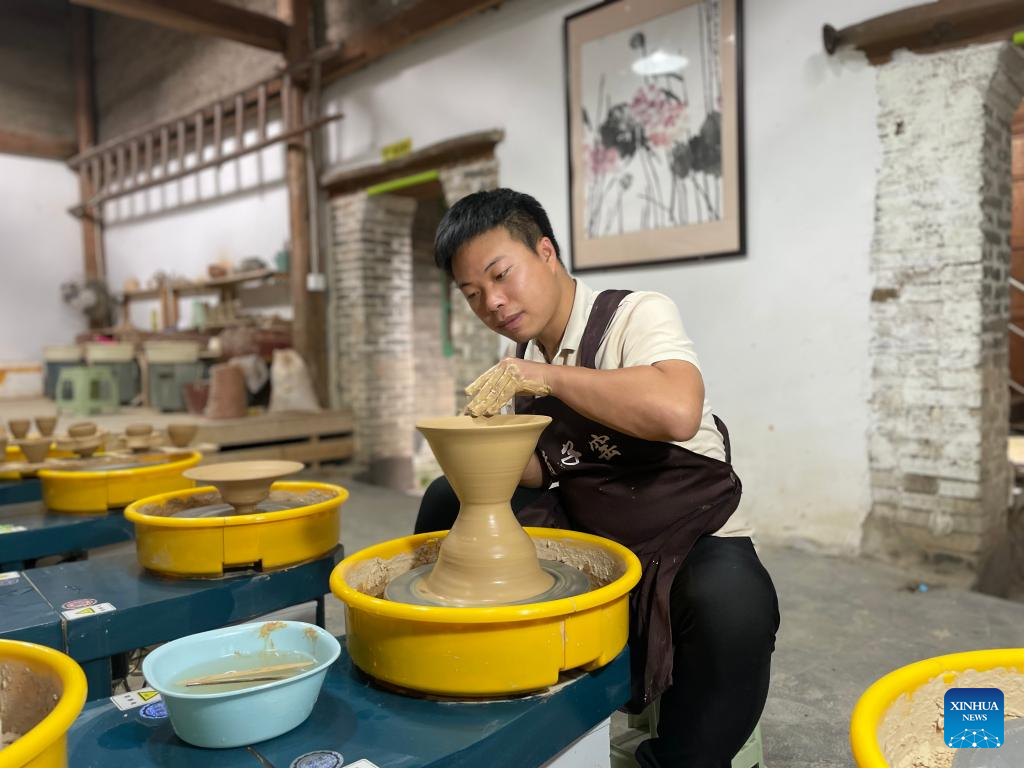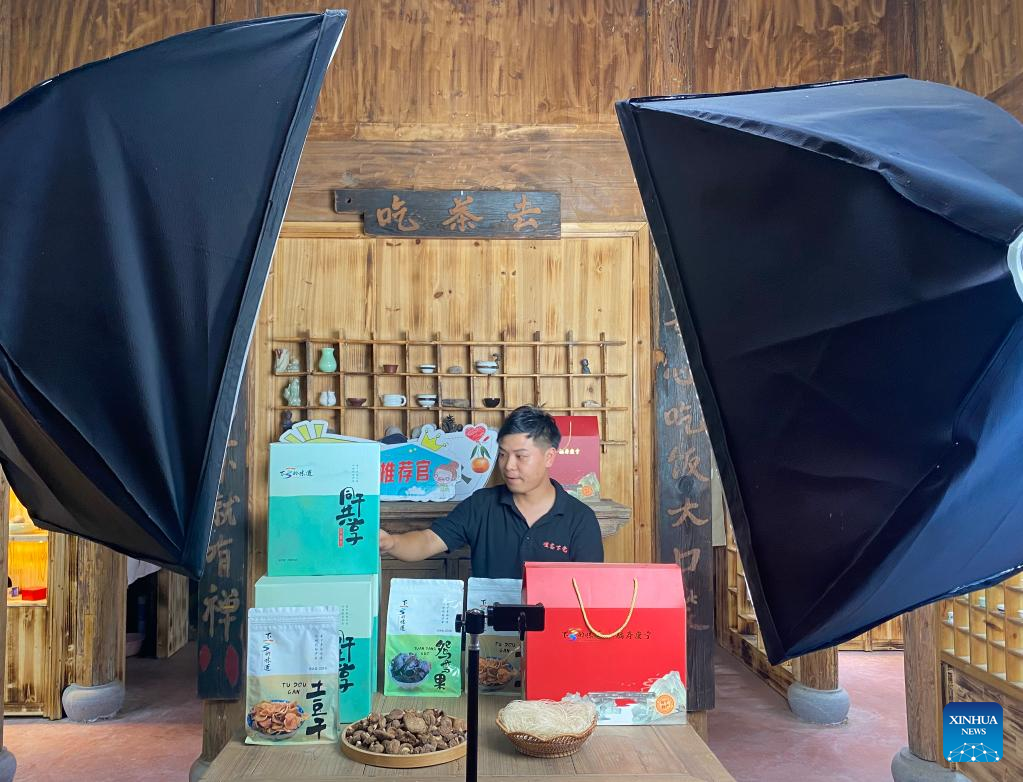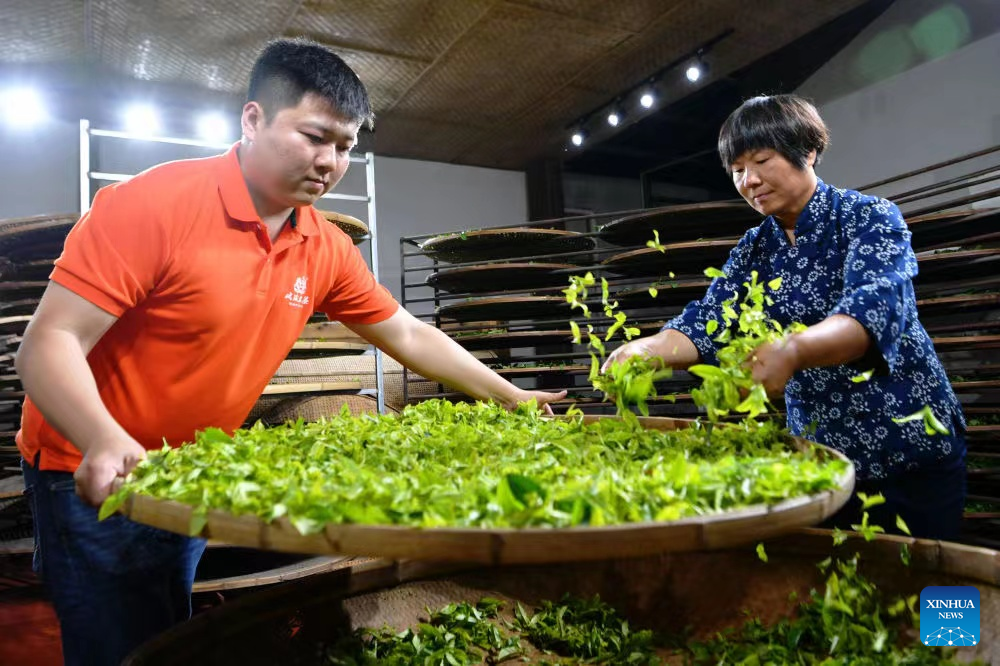Young Chinese building careers in rural areas

Liu Yefeng makes a porcelain product at the Zhuziyao porcelain cultural and creative studio in Wufu Township of Wuyishan, southeast China's Fujian Province, Sept. 6, 2022. (Xinhua)
On Sept.7, in Fuzhou, as China's rural revitalization campaign deepens, young Chinese people, armed with new concepts and technologies, are choosing to start their businesses in the countryside.
While pursuing their dreams in vast rural areas, they have also been playing an important role in promoting modern agriculture and bringing new vitality to rural economic development.
TECH POWERS TEA GARDENS
At the Xiqiu Dapingzhou ecological tea plantation, trees such as osmanthus, ginkgo, and yew are interplanted with tea.
Fang Zhou, 32, is the owner of the tea plantation, which is located in Xingcun Township of the city of Wuyishan in east China's Fujian Province.
In 2016, after obtaining a master's degree in big data analysis in Britain, Fang returned to his hometown of Xingcun and has been working at his family's tea garden ever since.
Part of a new generation of tea farmers, Fang is committed to combining the latest technologies with tea planting, such as interplanting green manure crops and introducing micro-organisms to control pests.
"Interplanting green manure crops such as rape flowers and soybeans with tea plants can supplement soil fertility and effectively prevent tea plants from being bitten by insects," he said.
Through big data analysis and scanning modeling, Fang and his team developed an intelligent tea-picking machine with a tea leaf-picking quality rate of over 90 percent.
"The intelligent machine will help reduce the labor pressure during the busy farming season and further improve the tea quality," he said.
"I want to combine my knowledge with the experience of my predecessors to help transform and upgrade traditional agriculture," Fang said. "As China's rural revitalization efforts strengthen, the tea mountains will be a dream-seeking place for the new generation of tea farmers in Wuyishan."
IDEAS CARRY FORWARD CULTURE
When walking into the Zhuziyao porcelain cultural and creative studio, visitors are often impressed by the rows of porcelain of different shapes and sizes displayed on a long wooden table.
Liu Yefeng, 27, is one of the founders of the studio, which is located in Wufu Township in Wuyishan. After graduating from Fujian Jiangxia University in 2018, he went to Wufu to work for the local government.
With an interest in porcelain, he and two friends founded the studio. "For me, this is a brand new beginning, and my dream sets sail here," he said.
As the hometown of ancient Chinese philosopher Zhu Xi, Wufu has seen a booming tourism industry in recent years, welcoming approximately 200,000 visits every year.
"Many tourists come to the studio to learn how to make porcelain. The studio is often booked up on weekends during the tourist season," Liu said.
His studio is committed to integrating traditional cultural elements into product design. He has recently been busy with the design of a new product inspired by Longyuxi, a traditional style of folk opera popular in Wufu.
"We hope to carry forward the local culture of Wufu through our products," Liu said.
"Rural development requires the efforts of the younger generations, and also gives youths a broad stage upon which to chase and realize their dreams," he said.
E-COMMERCE ENRICHES FARMERS
"Hello everyone and welcome to my livestream room," said Xia Meixiong, looking into the camera on his smartphone and interacting with viewers.
As a livestream anchor, 33-year-old Xia operates a channel on the short video platform Douyin, helping villagers sell farm specialties online and posting short videos showing the natural scenery of Xiadang Township of the city of Ningde in Fujian.
Xia graduated from Fujian Polytechnic School in 2007 and used to work in the construction industry in the southwestern Chinese city of Chengdu. He went to Xiadang to start a business in 2020 after seeing the booming development of the township, which shook off poverty in 2018.
"In two years, we already have about 70,000 followers on our two accounts on Douyin. Last year, our livestream sales surpassed 1.7 million yuan (246,000 U.S. dollars)," Xia said. "Tea sales in Beikengshan Village were not good. Through our livestream room, the online sales of the whole village surpassed 200,000 yuan last year."
Xia and his team have also opened a farmhouse restaurant in Xiadang that saw a turnover of over 900,000 yuan last year.
Xia attributed his success to the preferential entrepreneurship policies in Xiadang. "Xiadang has not only waived the rent and utilities of the livestream room premises this year, but also provided a living allowance to the team members every month," he said.
"Devoting oneself to rural life is by no means a temporary passion, but a long-term exploration and commitment. I hope more young people will come to Xiadang to join the mission of rural revitalization," Xia said.

Xia Meixiong, a livestream anchor, prepares goods for online sale in Xiadang Township of Ningde, southeast China's Fujian Province, Aug. 25, 2022. (Xinhua/Xu Ruiqing)

Fang Zhou (L) learns to make Wuyi rock tea, a type of oolong tea, from his mother at a workshop in Xingcun Township of the city of Wuyishan, southeast China's Fujian Province, May 10, 2020. (Xinhua/Wei Peiquan)








